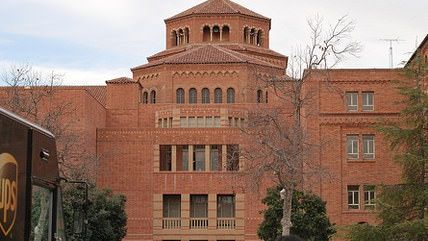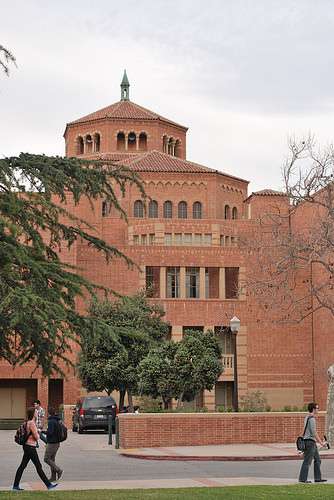University of California System Will Open Access to (Almost) All Scientific Research
Public will gain access to thousands of published research papers moving forward, though there is an opt-out process.


Activist Aaron Swartz's suicide drew attention not just to the aggressive and intimidating tactics of the Department of Justice's attorneys and the flaws with America's anti-hacking laws, but also to the "open access" movement. This movement proposes that academic research (particularly academic research funded through tax dollars) be made publicly accessible and not locked behind paywalls or expensive journal subscriptions. I wrote about the movement last year. Swartz's arrest and prosecution was due to his efforts to download significant numbers of academic journal articles from MIT to release them publicly.
Last Friday the University of California announced their entire system – all 10 campuses – will be opening up access moving forward:
The Academic Senate of the University of California has passed an Open Access Policy, ensuring that future research articles authored by faculty at all 10 campuses of UC will be made available to the public at no charge. "The Academic Council's adoption of this policy on July 24, 2013, came after a six-year process culminating in two years of formal review and revision," said Robert Powell, chair of the Academic Council. "Council's intent is to make these articles widely — and freely — available in order to advance research everywhere." Articles will be available to the public without charge via eScholarship (UC's open access repository) in tandem with their publication in scholarly journals. Open access benefits researchers, educational institutions, businesses, research funders and the public by accelerating the pace of research, discovery and innovation and contributing to the mission of advancing knowledge and encouraging new ideas and services.
The policy affects more than 8,000 faculty and their contributions to somewhere around 40,000 academic publications, according to the release. The FAQ for the policy explains that researchers will grant the University of California a license to publish their works freely. This is not a transfer of copyright, though. Furthermore, individual faculty members will have the ability to opt out of the system or set up an embargo requiring time to pass before their research becomes publicly available. This matters because the current system gives many journal publishers copyright control over the research. The publishers manage the process and arrange for peer review and, in exchange, profit off the subscriptions or selling access to the research. The embargo method is what the National Institute of Health requires for all research they help fund; the studies must become publicly available after one year. The Obama Administration announced in February it would like to expand this rule to any federal agency that spends more than $100 million a year in research in development. The embargo guidelines gives publishers time to recoup their costs and make a profit off the major institutions that demand immediate access, then open it up to everybody else.
UC's open access system will launch on Nov. 1.
Editor's Note: As of February 29, 2024, commenting privileges on reason.com posts are limited to Reason Plus subscribers. Past commenters are grandfathered in for a temporary period. Subscribe here to preserve your ability to comment. Your Reason Plus subscription also gives you an ad-free version of reason.com, along with full access to the digital edition and archives of Reason magazine. We request that comments be civil and on-topic. We do not moderate or assume any responsibility for comments, which are owned by the readers who post them. Comments do not represent the views of reason.com or Reason Foundation. We reserve the right to delete any comment and ban commenters for any reason at any time. Comments may only be edited within 5 minutes of posting. Report abuses.
Please to post comments


Furthermore, individual faculty members will have the ability to opt out of the system or set up an embargo requiring time to pass before their research becomes publicly available.
Solution: If you don't want your research made available, don't do it on the taxpayer dime.
Fist, it's too early to win the thread.
You're missing the aspect where no-one even considered moving in the opposite direction and having research entirely fund itself through the sale of its output, and not using tax dollars at all.
I mean, ROADS!, and Somalia!!11one, etc.
This, seriously. One of the myriad reasons I've largely shied away from my plans to enter academia is how so many researchers are just feel so fucking entitled to other people's money, and are so fucking self-righteous about it to boot.
Epidemiologists Vote to Keep Doing Junk Science
http://www.manhealthissue.com/.....ience.html
Epidemiologists Vote to Keep Doing Junk Science
Epidemiology Monitor (October 1997)
An estimated 300 attendees a recent meeting of the American College of
Epidemiology voted approximately 2 to 1 to keep doing junk science!
Specifically, the attending epidemiologists voted against a motion
proposed in an Oxford-style debate that "risk factor" epidemiology is
placing the field of epidemiology at risk of losing its credibility.
Risk factor epidemiology focuses on specific cause-and-effect
relationships?like heavy coffee drinking increases heart attack risk. A
different approach to epidemiology might take a broader
perspective?placing heart attack risk in the context of more than just
one risk factor, including social factors.
Risk factor epidemiology is nothing more than a perpetual junk science machine.
But as NIEHS epidemiologist Marilyn Tseng said "It's hard to be an
epidemiologist and vote that what most of us are doing is actually harmful
to epidemiology."
One must remember this California College is the home of GOVERNMENT WELFARE GRANTS!
It is also the home to anti-tobacco studies aka THIRD HAND SMOKE! This is the type of junk science they will hide from public scrutiny and there is a LITERAL TON of it at this university to hide!
The Obama Administration announced in February it would like to expand this rule to any federal agency that spends more than $100 million a year in research in development.
How much does the DoD spend on R&D, I'd like to peruse some academic works on ray guns.
Unless you can come up with something better than, or an improvement on, chemical lasers, probably won't get much traction.
I think the broad investigation of weird weapons, will accompanying broad spending, ended in the 80's. With railguns and chemical lasers being the only tech worth further research.
We have some ongoing research into sonic and microwave crowd control, which could be fun.
Besides we really need to get the "gay bomb" up and running:
So integrating women into combat units is a defensive measure?
I forgot about those beams. Have you started writing your grant application?
I was hoping to poach someone else's research. My R&D department is woefully understaffed.
monocle polishers are suprisingly adept in the the optics field.
causing what the military called a "distasteful but completely non-lethal" blow to morale.
Hahahaha!
Also, would be particularly effective against Russia.
"This movement proposes that academic research (particularly academic research funded through tax dollars) be made publicly accessible and not locked behind paywalls or expensive journal subscriptions."
Another idea might have been to privatize some of these institutions; certainly, Berkeley and UCLA can stand on their own two feet.
On the "downside", though, privatizing these institutions might save California's taxpayers a ton of money, so, obviously, that'll never happen.
I'd bet the colleges are actually making the state money, unlike every other endeavor they undertake.
I'm sure tuition would be higher--they'd look like Stanford and USC, tuition-wise.
But then we've already got a whole 'nother low tuition system--We've got the Cal State system on top of the UC system.
...Oh, and that isn't taking the community college system into consideration!
We have thirty (30) public universities in California, and we have another one hundred and twelve (112) community colleges.
*ahem*
Talk about an institutional Flustercluck!
Why we need to support Berkeley and UCLA with our tax dollars when there are already another one hundred and forty (140) low tuition options funded by the state of California is beyond me. But then I care about my money and the taxes I pay, so I guess I'm just a stupid redneck.
Janet will save the UC system.
Just like she saved america from terrorists.
All those wonderful gender studies papers will be accessible to anyone that has an interest in achieving peaceful sleep at night. Or swat that annoying fly with something more fitting than a rolled-up newspaper.
There's a place for non-STEM classes and degrees in the world.
I'd love to be able to go back and take more Latin and Greek. Seems like there's and awful lot of competition for professorships in that field, though, and if you're trying to make it in a field like that? The government giving your competition cheap loans for tuition isn't helping you any. Talk about moral hazard...
If the only people chasing professorships in those majors were the people who made the sacrifices to study those disciplines--sans copious amounts of cheap money from the government? Those fields might not have half the bad rep they do. I mean, how many people majoring in Women's Studies, Anthropology, and Art History are just there because they've got nothing better to do at home?